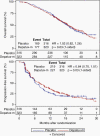Depatuxizumab mafodotin in EGFR-amplified newly diagnosed glioblastoma: A phase III randomized clinical trial
- PMID: 35849035
- PMCID: PMC9925712
- DOI: 10.1093/neuonc/noac173
Depatuxizumab mafodotin in EGFR-amplified newly diagnosed glioblastoma: A phase III randomized clinical trial
Abstract
Background: Approximately 50% of newly diagnosed glioblastomas (GBMs) harbor epidermal growth factor receptor gene amplification (EGFR-amp). Preclinical and early-phase clinical data suggested efficacy of depatuxizumab mafodotin (depatux-m), an antibody-drug conjugate comprised of a monoclonal antibody that binds activated EGFR (overexpressed wild-type and EGFRvIII-mutant) linked to a microtubule-inhibitor toxin in EGFR-amp GBMs.
Methods: In this phase III trial, adults with centrally confirmed, EGFR-amp newly diagnosed GBM were randomized 1:1 to radiotherapy, temozolomide, and depatux-m/placebo. Corneal epitheliopathy was treated with a combination of protocol-specified prophylactic and supportive measures. There was 85% power to detect a hazard ratio (HR) ≤0.75 for overall survival (OS) at a 2.5% 1-sided significance level (ie traditional two-sided p ≤ 0.05) by log-rank testing.
Results: There were 639 randomized patients (median age 60, range 22-84; 62% men). Prespecified interim analysis found no improvement in OS for depatux-m over placebo (median 18.9 vs. 18.7 months, HR 1.02, 95% CI 0.82-1.26, 1-sided p = 0.63). Progression-free survival was longer for depatux-m than placebo (median 8.0 vs. 6.3 months; HR 0.84, 95% confidence interval [CI] 0.70-1.01, p = 0.029), particularly among those with EGFRvIII-mutant (median 8.3 vs. 5.9 months, HR 0.72, 95% CI 0.56-0.93, 1-sided p = 0.002) or MGMT unmethylated (HR 0.77, 95% CI 0.61-0.97; 1-sided p = 0.012) tumors but without an OS improvement. Corneal epitheliopathy occurred in 94% of depatux-m-treated patients (61% grade 3-4), causing 12% to discontinue.
Conclusions: Interim analysis demonstrated no OS benefit for depatux-m in treating EGFR-amp newly diagnosed GBM. No new important safety risks were identified.
Keywords: EGFR; antibody drug conjugate; depatuxizumab mafodotin; glioblastoma; phase III.
© The Author(s) 2022. Published by Oxford University Press on behalf of the Society for Neuro-Oncology.
Figures



References
-
- Libermann TA, Nusbaum HR, Razon N, et al. Amplification, enhanced expression and possible rearrangement of EGF receptor gene in primary human brain tumours of glial origin. Nature 1985;313(5998):144–147. - PubMed
-
- Gan HK, Cvrljevic AN, Johns TG. The epidermal growth factor receptor variant III (EGFRvIII): where wild things are altered. FEBS J. 2013;280(21):5350–5370. - PubMed
-
- Cleary JM, Reardon DA, Azad N, et al. A phase 1 study of ABT-806 in subjects with advanced solid tumors. Invest New Drugs. 2015;33(3):671–678. - PubMed
Publication types
MeSH terms
Substances
LinkOut - more resources
Full Text Sources
Medical
Research Materials
Miscellaneous

